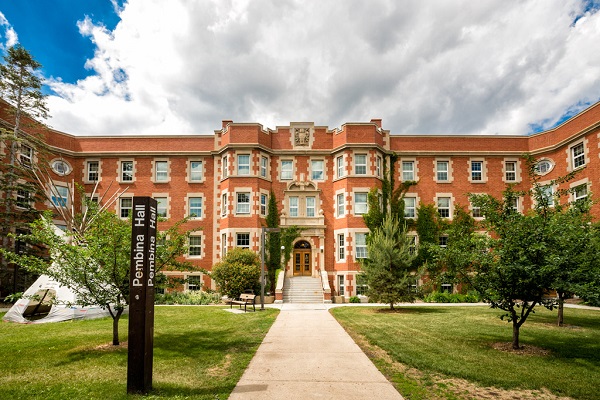University of Alberta: Front-line battle against COVID-19 inspires innovative respirator project
University of Alberta engineering professor Rafiq Ahmad felt helpless when the earliest images of the toll COVID-19 was taking in Italy and Spain started making headlines in North America.
“There are many millions of people out there who want to do something, but they don’t have the capacity, they don’t have the capability or the resources,” he said. “We are engineers—we can solve problems, we have the capacity, we have the resources.
“We also have some good brains in the people from the different countries that we work with, so we can design something completely new, out of the box.”
Among those brains was Emanuel Martínez Villanueva, a master’s student in Ahmad’s lab who came to the U of A by way of Mexico’s Tecnológico de Monterrey (TEC). Ahmad, who has been recruiting grad students from Mexico for a decade and working on smart manufacturing research projects with TEC researchers for just as long, made Villanueva the lead engineer on the project.
“Not only does international mobilization give our research wider exposure, the diversity of our students that it brings gives us new ideas and new collaborations—if we are lacking one expertise, then another partner can fill in what’s missing,” said Ahmad.
Inspiration for innovation
What was particularly distressing for Ahmad was watching Italian and Spanish front-line workers coming down with the disease.
“We thought, OK, let’s try something for the front-line workers; that will be the major impact if things go wrong in Canada,” said Ahmad, whose Laboratory for Intelligent Manufacturing, Design and Automation shifted to become an ad hoc group called the COVID-19 Mobile Respirator Design Team.
The project played directly into Villanueva’s skill set, thanks to his previous experience designing air filters and fuel tanks for the automotive industry in Mexico.
“Basically what I did was to take the same process that they usually use for filters in trucks, but to develop this product,” said Villanueva.
What the team developed was a personal protective respirator, or PROPOS, which combines a snorkelling mask with hoses to a special battery-powered fan and filter system—which employ’s industry partner ACAMP’s A95 filters—to help keep front-line workers safe from COVID-19.
Ahmad is now partnering with the design and manufacturing company Flexcim Services, and with Alberta Innovates and the Natural Sciences and Engineering Research Council of Canada, to get the device mass-produced, which he hopes will start in September.
And while the earliest version of the PROPOS is not yet approved for a medical setting, Ahmad sees it as a tool that could be used to protect people in non-medical settings, essential workers in industry or even in educational settings.
“The focus is that, if there is any further pandemic or if there is a new pandemic, we should be ready for that kind of mass production,” he said.
International partnership tackles global challenges
Ultimately, having the right minds in the right place to create the potentially life-saving project was made possible thanks to a blossoming partnership between the U of A and TEC, whose 31 campuses in 25 cities serve 92,000 students.
“It is a top five institution in all of Latin America, it is a Worldwide Universities Network member, and there are only two Latin American universities in that global network,” said Cristian Gonzalez-Paez, regional manager of the Americas for University of Alberta International.
“Mexico is part of the Canada-United States-Mexico agreement (CUSMA), it is a strategic partner for both our federal and provincial governments, and within Mexico, TEC de Monterrey is a priority institution for the University of Alberta.”
In November, the U of A entered a seed grant program with TEC that had researchers from each institution submit joint research proposals competing for C$45,000 in funding to explore signature area themes of artificial intelligence and energy.
The first-round winners were:
Carrie Demmans Epp (Computing Science) and Genaro Rebolledo-Méndez for their project, The Role of Affect in Online Higher Education: A Comparative Study in Canada and Mexico
Bo Cao (Psychiatry) and Luis Trejo for their project, Early Detection of Depression and Other Mental Disorders Using Machine Learning
Yunwei Ryan Li (Electrical and Computer Engineering) and Gerardo Escobar for their proposal, Development of Smart Grid and Energy Storage Management Technologies for Distribution Networks
Matthew Taylor (Computing Science) and Miguel Ángel Medina-Pérez for their proposal, Human-in-the-Loop Software for Improving Latent Fingerprint Identification
The two universities, along with the University of Texas at Austin, started a North American Energy Dialogue webinar series to highlight specific energy challenges through a North American perspective. The fourth webinar, held in June, focused on carbon capture utilization and storage technologies and their role in industrial decarbonization.
“Besides being a research partner, they are also now a public relations partner—we’re tackling these interesting issues together,” said Gonzalez-Paez. “Ultimately we would love it if our students could really start to go down there at the undergraduate level, learn some Spanish and get a better understanding of what Mexican working culture is like, and expand their horizons.”

